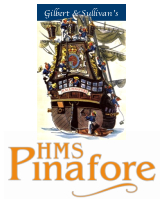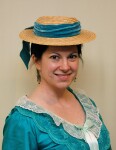
Three cheers and one cheer more for Conductor Alan Yost, Chorus Director Sarah Telford, and the hardy crew of The HMS Pinafore for two outstanding performances on April 5 and 6, 2008!



Produced by David Atwood, Sally Bull and Carole Wayland
Box Office: Dick and Cathy Sur, June GraceCostumes: Dolores CarabilloFront of House: Dorrie BeanLighting: David Atwood and Rick ShamelPrinting: Bill MaxwellPrograms: Carole WaylandProps: M.A. Bramhall, Sally Bull, Charlotte KelleyPublicity: Dorothy Schecter, Rik Pierce, Carole WaylandRefreshments: Dorrie Bean and Gail PenrodShip’s Wheel: Courtesy of Savoyard Light Opera CompanyTickets: Carole WaylandUshers: Joanne Hines and Carol Barron
Synopsis
The crew of the H.M.S. Pinafore polishes brasswork and splices lines as Little Buttercup hawks her basket of wares. Dick Deadeye is easily as unpopular as he claims to be. Able seaman Ralph Rakestraw is in love with a girl who is, alas, far above his social station. In fact, he is love with none other than Josephine, the captain’s daughter. Captain Corcoran, who is “hardly ever sick at sea”, learns that his daughter is sought in marriage by Sir Joseph Porter, first lord of the admiralty. But Josephine sadly tells her father that her heart is given to another, a humble sailor on her father’s own ship. She vows to carry her love to the tomb, never revealing it to the one she loves.
Sir Joseph, who has an entourage of female relatives—sisters and cousins and aunts, has absolutely no naval experience and posits a belief that each noble English seaman is only lower than the captain in social rank due to an “accident of birth” and is any man’s equal, excluding his own. Sir Joseph compliments Ralph Rakestraw as an exemplary seaman. Ralph takes courage from Sir Joseph’s equality speech, and all his mates, except Dick Deadeye, agree that he should make his feelings for Josephine known.
Josephine laments Sir Joseph’s advances and reveals that Ralph is the object of her love. Ralph declares his love for her but she spurns his advances, calling his attention to the difference in their social stations. Ralph decides that his life no longer has meaning and decides to shoot himself. Josephine cries “Stay your hand, I love you!”
Buttercup loves the captain. He would love her, were it not for the difference in social stations. Buttercup tells the captain there is a change in store for him. Sir Joseph comes to tell that the captain that his daughter just won’t do. The captain urges Sir Joseph to tell Josephine that the difference in their social ranking is not important if two people love each other. Josephine laments the quandary she finds herself in. Whom should she choose, Sir Joseph with his wealth and social status, or poor Ralph Rakestraw, whom she loves dearly? Sir Joseph, unwittingly, helps her to make up her mind with his assurance that social rank is unimportant.
Dick Deadeye announces that Ralph and Josephine are planning to elope. The captain, Sir Joseph, and Dick intercept the young couple, vowing to put Ralph to the lash. The crew sings “He Is an Englishman,” and the captain breaks his vow never to swear. Sir Joseph defends Ralph as anyone’s equal until Josephine appears and rushes to Ralph’s arms, whereupon he demands that Ralph be taken to the dungeon. Buttercup then reveals her long-kept secret. Long ago, she had nursed two infants, one of lowly birth, the other a patrician. She mixed the infants up, switching one for the other. The captain was the common-born child, and Ralph the child of privilege!
Ralph, then, is the one of superior social rank, and can choose to marry Josephine. The captain, being common-born, has no social standing over Buttercup and can marry her. Sir Joseph decides that Hebe, his own cousin, would make a suitable wife and three weddings ensue.






